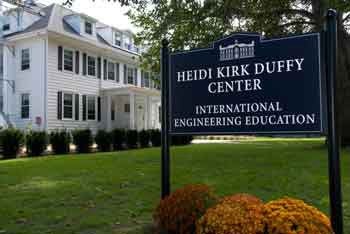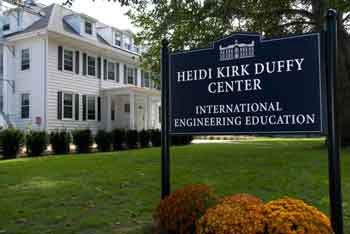 KINGSTON, R.I. – September 28, 2007 — The International Engineering Program at the University of Rhode Island celebrated its 20th anniversary today with the grand opening of a renovated building to house students and program offices, and the recognition of major supporters of the program.
KINGSTON, R.I. – September 28, 2007 — The International Engineering Program at the University of Rhode Island celebrated its 20th anniversary today with the grand opening of a renovated building to house students and program offices, and the recognition of major supporters of the program.
“This program — one of the most prestigious on campus — attracts top students from around the country, and leading global companies aggressively seek them out upon graduation,” said URI President Robert L. Carothers. “It’s a program about which we are all most proud, so we are excited to be celebrating this anniversary with today’s grand opening.”
“Combining an engineering degree with foreign language training makes URI graduates more competitive in the global market,” Governor Donald L. Carcieri said. “With the growth of multi-national companies with offices in various countries, this type of dual training will be a real advantage for engineers who need to communicate in more than one language.”
The program requires students to complete simultaneous degrees in a foreign language (German, French, Spanish or Chinese) and an engineering discipline and spend a year working and studying abroad. It was conceived by former URI Engineering Dean Hermann Viets and John Grandin, a professor of German who has served as director of the program since its inception in 1987.
“Ours is the first program in the nation to offer a complete language degree, a complete engineering degree, and a year abroad, all in five years,” said Grandin. “It has become a model that many other universities have followed.”
The new home of the International Engineering Program is a former fraternity, Chi Phi, which was transformed and expanded into a living and learning community for students in the program. It houses 37 students and includes a community room, meeting space, a videoconferencing facility, and a student dining room.
The program was formerly housed in an adjacent building, the IEP House, where an additional 40 students in the program will continue to live. The side-by-side buildings, connected by new walkways and a beautiful patio, will be known as the Heidi Kirk Duffy Center for International Engineering Education, named for the chair of the program’s advisory board and a long-time supporter of international education at URI. Duffy donated her yacht to the program, and the $400,000 proceeds from its sale were used to purchase the fraternity building.
“I’m extremely pleased to see that my support of the IEP program is helping it to grow in both size and prestige,” said Duffy. “And I’m honored to have my name linked to the Center for International Engineering Education.”
The building’s renovation was undertaken with the generous support of three major donors.
The Sensors and Controls Division of Texas Instruments (now Sensata Technologies) contributed $400,000 to the program, most of which was used for renovations to the new facility, with the rest devoted to scholarships and program support. Thomas Wroe, president of Sensata, is a URI alumnus, and its senior vice president, Donna Kimmel, serves on the International Engineering Program Advisory Board.
“Together, Tom Wroe and Donna Kimmel have been strong advocates for the expansion of the program,” Grandin noted. “In honor of their efforts and thanks to the support from their company, the new building will be named the Texas Instruments House.”
“Tom Wroe and I truly believe that the creation of international opportunities for a wide range of educational programs gives students a tremendous leg up on their competition, and we are pleased that the IEP has been visionary in doing just that,” Kimmel said. “We look forward to collaborating with the program for many years to come.”
The second floor of the building will be called the Max Kade German Language Learning Community, named for the foundation that contributed $200,000 to support the renovation of the facility. The foundation was established by a German immigrant who made his fortune producing cough syrup and who was committed to promoting German language and culture programs. The Max Kade Foundation has provided funding for many buildings at universities throughout the U.S. and Germany, with the goal of promoting the mutual understanding of the people and cultures of the two countries.
Z.F. Friedrichshafen AG, a manufacturer and supplier of transmissions, chassis and other components for the automobile industry, also contributed $200,000 in support of the building renovation.
“ZF is a global company and has been collaborating with our program from the beginning by offering our students internship opportunities and hiring our graduates,” Grandin said. “They like what we’re doing here, and they have been very generous supporters over the years.”
The videoconferencing equipment in the facility was purchased with a $30,000 grant from the National Science Foundation, enabling guest lecturers from around the world to speak directly with students in the program.
The 20th anniversary celebration concluded with a ceremony formalizing a new dual-degree doctoral program in conjunction with the Technical University of Braunschweig, the International Engineering Program’s primary education partner in Germany. Carothers and Braunschweig Vice President Müfit Bahadir signed a memorandum of understanding enabling Ph.D. students to spend part of their education at URI and the remainder at Braunschweig. Graduates will receive a doctoral degree from both universities. The program was approved by the Rhode Island Board of Governors for Higher Education in August.
INTERNATIONAL ENGINEERING PROGRAM FACTS
• 2007 marks the 20th anniversary of the establishment of the International Engineering Program at URI.
• Today, URI dedicates the former Chi Phi fraternity house as the Texas Instruments House, the second of two IEP houses on Upper College Road where IEP students can meet, get help and advice, and live in comfortable and modern accommodations.
• The International Engineering Program is renowned around the world because it leads students simultaneously to degrees in both engineering French, German, Spanish or Chinese. Begun in 1987, the IEP was designed to meet the needs of business and industry in the rapidly evolving global workplace.
• The program boasts a 100 percent placement rate and cannot keep pace with the worldwide need for engineers with cross-cultural communication skills.
• The University joined this year with the Technical University of Braunschweig to offer a dual doctoral degree. The doctoral program joins the existing dual master’s degree with the German university. Students in these two programs will carry out a portion of their study programs at Braunschweig in Germany.
• IEP students study language and culture each semester along with their engineering curriculum. In the fourth year of the five-year program, they then go abroad as interns with engineering based firms in Europe, Latin America, or China, and also as exchange students with one of our partner universities.
• IEP students graduate with an excellent engineering background, with fluency in at least one language other than English, and with concrete engineering work experience under their belts. Because of the rapid expansion of global business, IEP grads are in very high demand.

